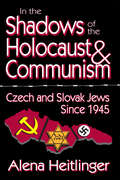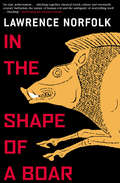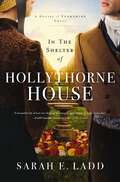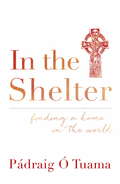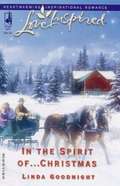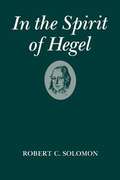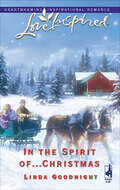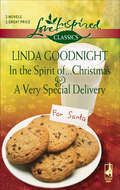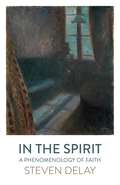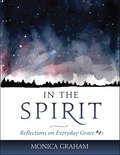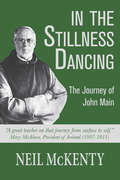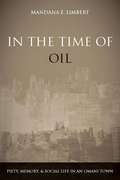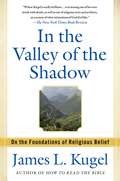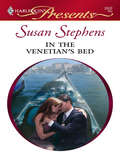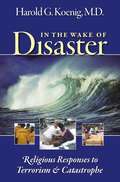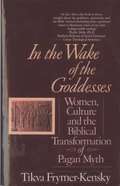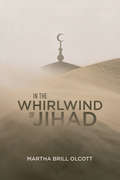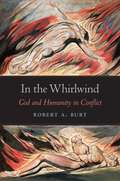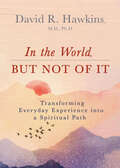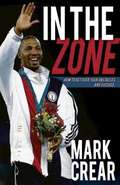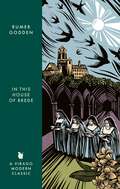- Table View
- List View
In the Shadows of the Holocaust and Communism: Czech and Slovak Jews Since 1945
by Alena HeitlingerWhen traumatic historical events and transformations coincide with one's entry into young adulthood, the personal and historical significance of life-course transitions interact and intensify. In this volume, Alena Heitlinger examines identity formation among a generation of Czech and Slovak Jews who grew up under communism, coming of age during the de-Stalinization period of 1962-1968.Heitlinger's main focus is on the differences and similarities within and between generations, and on the changing historical and political circumstances of state socialism/communism that have shaped an individual's consciousness and identity—as a Jew, assimilated Czech, Slovak, Czechoslovak and, where relevant, as an emigre or an immigrant. The book addresses a larger set of questions about the formation of Jewish identity in the midst of political upheavals, secularization, assimilation, and modernity: Who is a Jew? How is Jewish identity defined? How does Jewish identity change based on different historical contexts? How is Jewish identity transmitted from one generation to the next? What do the Czech and Slovak cases tell us about similar experiences in other former communist countries, or in established liberal democracies?Heitlinger explores the official and unofficial transmission of Holocaust remembering (and non-remembering), the role of Jewish youth groups, attitudes toward Israel and Zionism, and the impact of the collapse of communism. This volume is rich in both statistical and archival data and in its analysis of historical, institutional, and social factors. Heitlinger's wide-ranging approach shows how history, generational, and individual biography intertwine in the formation of ethnic identity and its ambiguities.
In the Shape of a Boar (Books That Changed the World)
by Lawrence Norfolk&“One of the year&’s most imaginative and challenging novels&” from the acclaimed author of John Saturnall&’sFeast(Kirkus Reviews, starred review). Lawrence Norfolk&’s In the Shape of a Boar is a juggernaut of a novel, an epic tour de force of love and betrayal, ancient myths and modern horrors. The story begins in the ancient world of mythic Greece, where a dark tale of treachery and destructive love unfolds amid the hunt for the Boar of Kalydon—a tale that will reverberate in those same hills across the millennia in the final chaotic months of World War II, as a band of Greek partisans pursues an S.S. officer on a mission of vengeance. After the war, a young Jewish Romanian refugee, Solomon Memel, who was among the hunters will create a poem based on the experience, which becomes an international literary sensation. But the truth of what happened in the hills of Kalydon in 1945 is more complicated than it seems, and as the older Sol reunites with his childhood love in 1970s Paris, the dark memories and horrors of those days will emerge anew. &“An epic achievement . . . stitching together classical Greek culture and twentieth-century barbarism, the nature of human evil and the ambiguity of storytelling itself . . . Dazzling.&”—San Francisco Chronicle &“Brilliant and exhaustively researched . . . In the Shape of a Boar is a Herculean task accomplished with bravado and style, but more than that, it&’s storytelling of the highest echelon.&”—The Hartford Courant &“Wonderfully complex . . . a fascinating story built from layered narrative lines.&”—The Washington Post Book World
In the Shelter of Hollythorne House (The Houses of Yorkshire Series #2)
by Sarah E. LaddA young widow faces an uncertain future . . . until an unexpected encounter with her first love gives her heart a second chance in this Regency romance set on the Yorkshire Moors.England, 1817—Charlotte Grey thought she had seen the last of Anthony Welbourne. Knowing her father would never consent to his only daughter marrying a man he deemed beneath their family&’s station, Charlotte bid her final farewell to Anthony and vowed never to turn back. Instead, she honored her father&’s wishes by marrying the wealthy Roland Prior.Determined to put his love for Charlotte in the past, Anthony chose to immerse himself in a life full of meaning—first as a soldier fighting a war overseas, then as a member of William Walstead&’s watchmen, a rugged band of men dispatched to deal with perilous situations. Fearless and persistent, he makes it his life&’s focus to fight for those who can&’t fight for themselves.When Charlotte&’s husband dies unexpectedly, she quickly realizes how blind she&’d been to his nefarious ambitions and how many people he&’d angered on his relentless quest for wealth. To protect her infant son, Henry, from those who wish him harm, she and the baby flee to Hollythorne House, her childhood home. There Charlotte comes face-to-face with her former love, who has been sent as one of the hired watchman to protect her and Henry until the details of her late husband&’s estate are settled.Anthony&’s presence brings back feelings she never expected to have again, and she struggles to trust his intentions. Are the watchmen really looking after Charlotte as they claim—or are they looking to make trouble for Roland&’s estate and heir? Despite the constant reminders of their past, Anthony must remain focused on the task he was hired to do. But when new threats emerge and the past collides with the present, both must decide what they are willing to risk for the chance to right old wrongs and carve out a new future . . . together.Sweet Regency romancePart of the Houses of Yorkshire series but can be read as a stand-alone novelIncludes discussion questions for book clubs
In the Shelter: Finding a Home in the World
by Padraig O TuamaThere's an old Irish proverb: 'It is in the shelter of each other that the people live'. In this book much-loved poet, storyteller, theologian, and speaker P?draig ? Tuama applies ideas of shelter and welcome to journeys of life, using poetry, story, biblical reflection and prose to open up gentle ways of living well in a troubled world. The fourth gospel tells of Jesus arriving in the room where the disciples are gathered, full of fear, on Easter Sunday. He does not chide or admonish; instead he says 'Peace be with you', which, in the Aramaic of his day, was simply a greeting. 'Hello,' he said, welcoming people locked in a room of fear to a place of deep encounter; encounter with themselves, with their fear, with each other and with the incarnate one in their midst. Interweaving everyday stories with analysis, gospel reflections with mindfulness and Celtic spirituality with poetry, this book explores the practice of welcoming as a spiritual discipline. In particular, P?draig tells careful stories of welcoming parts of life that are often unwelcome.
In the Shelter: Finding a Home in the World
by Padraig O TuamaIt is in the shelter of each other that the people live.Drawing on this Irish saying, poet, storyteller and theologian Pádraig Ó Tuama relates ideas of shelter and welcome to journeys of life, using poetry, story, biblical refelction and prose to open up gentle ways of living well in a troubled world. The fourth gospel tells of Jesus arriving in the room where the disciples are gathered, full of fear, on Easter Sunday. He does not chide or admonish; instead he says 'Peace be with you', which, in the Aramaic of his day, was simply a greeting. To people locked in a room of fear he said 'Hello,' welcoming them to a place of deep encounter: encounter with themselves, with their fear, with each other and with the incarnate one in their midst.Interweaving everyday stories with narrative theology, gospel reflections with mindfulness and Celtic spirituality with poetry, In the Shelter reveals the transformational power of welcome.
In the Spirit of Christmas
by Linda GoodnightHER CHRISTMAS WISH Since leaving her troubled past behind, Lindsey Mitchell relished living in the small Christian community of Winding Stair, Oklahoma. But as December approached, she knew she'd need help to run her tree farm. So she hired new arrival Jesse Slater. The widower and his little girl fit right in.. .except when it came to celebrating the spirit of the season. As the town banded together and introduced the newcomers to the local festivities, Lindsey sensed there were deeply rooted reasons for Jesse's lack of faith. Could she help him find his way back home and teach him and his adorable daughter the true meaning of Christmas?
In the Spirit of Hegel: A Study of G.W.F. Hegel's Phenomenology of Spirit
by Robert C. SolomonIn this book, the author captures the bold and exhilarating spirit, presenting the Phenomenology as a thoroughly personal as well as philosophical work. He begins with a historical introduction, which lays the groundwork for a section-by-section analysis of the Phenomenology. Both the initiated and readers unacquainted with the intricacies of German idealism will find this to be an accessible and exciting introduction to this philosopher's monumental work.
In the Spirit of the Maggid
by Paysach J. KrohnFor more than two decades, Rabbi Paysach Krohn has been inspiring and enthralling tens of thousands of readers with his "Maggid" series. Now the "American Maggid" is finally back again with a long-awaited new collection of unforgettable stories. There are many reasons why Rabbi Krohn's "Maggid" books make up one of the bestselling series in Jewish literary history. One reason is - the stories themselves. Each story is true, and each one is different. Each one is short enough to pack a punch, but long enough to touch the heart and ignite the soul. Some stories go back decades, even centuries, while others are pure twenty-first century - but all of them speak to our lives, to our contemporary concerns and challenges. Another reason is - the author himself. The warmth, perception, and insight of the man known as the American Maggid comes through in every line, every story. Rabbi Krohn understands us, our strengths and weaknesses, and he loves us as well. In his stories we can feel this acceptance and affection and therefore we allow the stories to teach us -- and to touch us. The maggidim of past centuries had their own special tools to reach the people: fascinating stories, humor - and, most of all, concern and caring for their people. These tools are what make up the "spirit of the maggidim." And this is what readers will enjoy in this new, wonderfully insightful book, In the Spirit of the Maggid.
In the Spirit of . . . Christmas: Heartwarming Inspirational Romance
by Linda GoodnightSince leaving her troubled past behind, Lindsey Mitchell relished living in the small Christian community of Winding Stair, Oklahoma. But as December approached, she knew she'd need help to run her tree farm. So she hired new arrival Jesse Slater. The widower and his little girl fit right in...except when it came to celebrating the spirit of the season. As the town banded together and introduced the newcomers to the local festivities, Lindsey sensed there were deeply rooted reasons for Jesse's lack of faith. Could she help him find his way back home and teach him and his adorable daughter the true meaning of Christmas?
In the Spirit of . . . Christmas & A Very Special Delivery
by Linda GoodnightTwo complete holiday inspirational romances featuring single fathers who find a second chance at love from a New York Times–bestselling author.In the Spirit of . . . ChristmasFor his daughter’s sake, widowed father Jesse Slater returns to Oklahoma to reclaim the family ranch. But their home is now a Christmas tree farm . . . run by a woman whose faith will change their lives forever.A Very Special DeliveryMolly McCreight has met the man of her dreams! But with her painful secret, how can she hope to spend the holidays—let alone the rest of her life—with single father Ethan Hunter and his precious baby girl?
In the Spirit: A Phenomenology of Faith
by Steven DeLayIn a series of analysis dealing with issues of basic human concern such as love, hope, joy, beauty, desire, suffering, evil, and death, Steven DeLay articulates an existence of faith in Christ. With attention to the Bible and works of art (Caravaggio, Doré, Pissarro, Poussin, Rembrandt, and Rodin), DeLay explores the depths of the human experience, offering a descriptive account of our personal encounter with God. A contribution to the longstanding tradition of edifying Christian works, In the Spirit extols the glory of being human in light of God's word.
In the Spirit: Reflections on Everyday Grace
by Monica GrahamThe wonder of a human hand; the tenacity of trillium; the restorative power of a hymnal: these topics and many more are explored in this thought-provoking collection of 80 spiritual essays from author-journalist Monica Graham.Taken from the best of the Chronicle-Herald column of the same name, In the Spirit explores with wit and wonder our human relationship with spirituality and religion. With a journalist’s curiosity, Graham asks the tough questions on a variety of subjects, from the implications of declining church membership, to Sunday shopping, to the merits of curiosity and acceptance in faith, but urges readers gently to come to their own conclusions. Whether we pray out loud or in silence, at the pub or the pew, this collection boldly holds each of us accountable to and responsible for our own spirituality, however we may choose to practice.
In the Stillness Dancing: The Journey of John Main
by Neil MckentyLong after ordination in 1963, John Main discovered that the form of prayer advocated by the swami already existed within the mainstream of Western Christianity but had fallen into disuse. From then on, he was to devote his life to restoring this form of Christian meditation to its rightful place within the Church. His work began with the foundation of a meditation centre at Ealing Abbey in London and led, some years later, to the foundation of the Benedictine Priory of Montreal and the establishment of a worldwide spiritual family linked through the daily practice of meditation. Neil McKenty paints an attractive portrait of this compelling Irish monk whose teaching and writing on meditation were to transform the lives of thousands of men and women.
In the Time of Oil
by Mandana E. LimbertBefore the discovery of oil in the late 1960s, Oman was one of the poorest countries in the world, with only six kilometers of paved roads and one hospital. By the late 1970s, all that had changed as Oman used its new oil wealth to build a modern infrastructure. In the Time of Oil describes how people in Bahla, an oasis town in the interior of Oman, experienced this dramatic transformation following the discovery of oil, and how they now grapple with the prospect of this resource's future depletion. Focusing on shifting structures of governance and new forms of sociality as well as on the changes brought by mass schooling, piped water, and the fracturing of close ties with East Africa, Mandana Limbert shows how personal memories and local histories produce divergent notions about proper social conduct, piety, and gendered religiosity. With close attention to the subtleties of everyday life and the details of archival documents, poetry, and local histories, Limbert provides a rich historical ethnography of oil development, piety, and social life on the Arabian Peninsula.
In the Twilight, In the Evening (Cheney Duvall, M. D. Ser. #6)
by Lynn MorrisFROM NEW ORLEANS TO SAN FRANCISCO, Cheney and Shiloh are now working at a large hospital--a contrast from their previous circumstances. Though Cheney is accepted and respected by most of the other doctors, the medical personnel under her supervision question her character, her intent, and her skills. Further, she and Shiloh must constantly be on alert to ensure that fair and conscientious medical treatment is provided to the city's down-and-outers. When a catastrophe strikes, they find themselves stretched far beyond their knowledge and experience. Cheney has to trust God for the help and direction she needs and remind herself that "...the ways of man are before the eyes of the Lord..." Catastrophe strikes without warning, and Cheny's medical training and experience have not prepared her for the struggle...
In the Valley of the Shadow: On the Foundations of Religious Belief
by James L. KugelTEN YEARS AGO, Harvard professor James Kugel was diagnosed with an aggressive, likely fatal, form of cancer. "I was, of course, disturbed and worried. But the main change in my state of mind was that the background music had suddenly stopped--the music of daily life that's constantly going, the music of infinite time and possibilities. Now suddenly it was gone, replaced by nothing, just silence. There you are, one little person, sitting in the late summer sun, with only a few things left to do." Despite his illness, Kugel was intrigued by this new state of mind and especially the uncanny feeling of human smallness that came with it. There seemed to be something overwhelmingly true about it--and its starkness reminded him of certain themes and motifs he had encountered in his years of studying ancient religions. "This, I remember thinking, was something I should really look into further--if ever I got the chance." In the Valley of the Shadow is the result of that search. In this wide-ranging exploration of different aspects of religion--interspersed with his personal reflections on the course of his own illness--Kugel seeks to uncover what he calls "the starting point of religious consciousness," an ancient "sense of self" and a way of fitting into the world that is quite at odds with the usual one. He tracks these down in accounts written long ago of human meetings with gods and angels, anthropologists' descriptions of the lives of hunter-gatherers, the role of witchcraft in African societies, first-person narratives of religious conversions, as well as the experimental data assembled by contemporary neuroscientists and evolutionary biologists. Though this different sense of how we fit into the world has largely disappeared from our own societies, it can still come back to us as a fleeting state of mind, "when you are just sitting on some park bench somewhere; or at a wedding, while everyone else is dancing and jumping around; or else one day standing in your backyard, as the sun streams down through the trees . . . " Experienced in its fullness, this different way of seeing opens onto a stark, new landscape ordinarily hidden from human eyes. Kugel's look at the whole phenomenon of religious beliefs is a rigorously honest, sometimes skeptical, but ultimately deeply moving affirmation of faith in God. One of our generation's leading biblical scholars has created a powerful meditation on humanity's place in the world and all that matters most in our lives. Believers and doubters alike will be struck by its combination of objective scholarship and poetic insight, which makes for a single, beautifully crafted consideration of life's greatest mystery.
In the Venetians Bed
by Susan StephensArrogant and ruthless, Luca Barbaro is the kind of man Nell hates most. Although helpless to resist his raw sexuality, she can never forgive his brutal coldness of years ago. Until they meet again in Venice one carnival night-not as Luca and Nell, but as two masked strangers in the grip of pure, irresistible attraction, untainted by the past. . . ;. But what happens when the masks come off?
In the Wake of Disaster: Religious Responses to Terrorism and Catastrophe
by Harold G. KoenigIn a timely book with a powerful and persuasive message, Dr. Harold G. Koenig addresses federal, state, and local government policy leaders, urging them to more fully integrate religious organizations into the formal disaster response system, and he then provides recommendations on how this can effectively be done. Koenig also advocates faith communities and organizations to learn more about the role they can play in responding to disasters and terrorism. The chaotic aftermath of Hurricane Katrina made extraordinarily clear the gaps in the United States' disaster policies. At the same time, the contributions of organized faith communities were highlights amidst the bungled federal, state, and local responses. One example is the New York Times, September 9, 2005, headline: "A New Meaning for 'Organized Religion': It Helps the Needy Quickly. " But as faith-based organizations look for ways to help, there are few, if any, guidelines for them. This book provides information on the psychological, social, and spiritual responses to trauma. It addresses how the emergency response system works, and the role that religious communities can play in disaster response and recovery in terms of providing emotional and spiritual care for victims. It advocates integrating mental health into emergency response systems directed at those affected by hurricanes, floods, earthquakes, and terrorism. "The aim is to help victims of disaster to better cope with the stresses they face, as well as help direct care workers (firefighters, police, health care providers, etc. ) to deal better emotionally with the trauma to which they are exposed so they can remain effective and functional on the job," explains Dr. Koenig, whose research on the healing power of faith has been published worldwide. Increasing the resiliency of our communities in the face of disaster is crucial. Religious communities have tremendous potential to contribute to this. Here are guidelines on how to do that more effectively, alongside data on how to facilitate the integration of these contributions with the formal disaster-response system.
In the Wake of the Goddesses: Women, Culture And The Biblical Transformation Of Pagan Myth
by Tikva Frymer-KenskyThe current return to spiritual values has spawned a surge of interest in the ancient goddess-based religions as a remedy to a long tradition of misogyny in the Western religions. In a provocative work of biblical scholarship on gender and sexuality, the author shows that the ideal of monotheism may offer far more to us today than a return to the gender-based worldview of the goddess religions.
In the Whirlwind of Jihad
by Martha Brill OlcottIn Uzbekistan, Central Asia's most populous country, Islam has been an ever-present factor in the lives of its people and a contentious force for political officials trying to build a secular and authoritarian government. In the Whirlwind of Jihad examines the intertwined and evolving relationships between religion, the state, and society in Uzbekistan from the late 1980s to today, encompassing the period from the collapse of the Soviet Union to the launch of the U.S.-led "war on terror" in neighboring Afghanistan. Martha Brill Olcott, the foremost expert on Central Asia, concludes that in an era of global communication and increased contact with international Islamic communities, a new role for Islam in Uzbekistan will ultimately emerge with implications beyond the country's borders.
In the Whirlwind: God and Humanity in Conflict
by Robert A. BurtGod deserves obedience simply because he’s God-or does he? Inspired by a passion for biblical as well as constitutional scholarship, in this bold exploration Yale Law Professor Robert A. Burt conceptualizes the political theory of the Hebrew and Christian Bibles. God’s authority as expressed in these accounts is not a given. It is no less inherently problematic and in need of justification than the legitimacy of secular government. In recounting the rich narratives of key biblical figures-from Adam and Eve to Noah, Cain, Abraham, Moses, Job, and Jesus-In the Whirlwind paints a surprising picture of the ambivalent, mutually dependent relationship between God and his peoples. Taking the Hebrew and Christian Bibles as a unified whole, Burt traces God’s relationship with humanity as it evolves from complete harmony at the outset to continual struggle. In almost every case, God insists on unconditional obedience, while humanity withholds submission and holds God accountable for his promises. Contemporary political theory aims for perfect justice. The Bible, Burt shows, does not make this assumption. Justice in the biblical account is an imperfect process grounded in human-and divine-limitation. Burt suggests that we consider the lessons of this tension as we try to negotiate the power struggles within secular governments, and also the conflicts roiling our public and private lives.
In the World, But Not of It: Transforming Everyday Experience into a Spiritual Path
by David R. Hawkins MD/PHDSpiritual teacher Dr. David R. Hawkins offers practical advice for readers to reach advanced states of consciousness in their everyday lives, so that they can enjoy being in the world, but not of it.It seems the further the world advances the harder it becomes to lead a life that is centered in love, grace, and compassion. That is, until now . . .In this book, based on the popular audio program of the same name, Dr. Hawkins shares his timeless insights on why certain spiritual experiences only provide temporary enlightenment. In the process, he explains how to turn normal activities into your spiritual practice.Readers will learn:· How to help raise the consciousness of the world· Why being accountable for choices and actions is central to one's spiritual evolution· How to make sure that you&’re taking responsibility for your life and choices· What to embrace—and what to avoid—in our technologically advanced world· How to avoid getting overly stressed by change· And much moreThis extraordinary program captures Dr. Hawkins&’s startling brilliance, infectious humor, and deep understanding of walking the awakened path as a citizen of the world.
In the Zone
by Mark CrearIn the Zone will keep you on-track with a clear-cut method to reach your goals. Many Christians struggle with getting from where they are to where they want to be. Some get stuck. Some have faith but not the will to make their dreams a reality. Others stumble. But champions find ways to clear their hurdles and run the race in the zone. What's it like to be in the zone? It's like you can't do anything wrong. All the pieces fall together effortlessly. Time slows down. Everything is in sync. You can't miss. Nothing distracts you. You have heightened awareness. You feel at your peak and you perform at your best. But a lot of effort goes into looking effortless. Someone who performs in the zone has spent countless hours practicing and thinking about all those pieces that seem to fit miraculously together in the heat of competition. And the ability to shut out distractions comes as a result of hard knocks. Using the metaphor of hurdling from his own medal-winning Olympic experiences, Mark Crear shows readers that, with discipline, you can stay in the zone and overcome the obstacles that block your success.
In this House of Brede: A Virago Modern Classic (Virago Modern Classics #163)
by Rumer GoddenBy the author of Black Narcissus.'Her craftsmanship is always sure; her understanding of character is compassionate and profound; her prose is pure, delicate, and gently witty' New York Times'The motto was Pax but the word was set in a circle of thorns. Peace, but what a strange peace, made of unremitting toil and effort.'Bruised by tragedy, Philippa Talbot leaves behind a successful career with the civil service for a new calling: to join an enclosed order of Benedictine nuns. In this small community of fewer than one hundred women, she soon discovers all the human frailties: jealousy, love, despair. But each crisis of heart and conscience is guided by the compassion and intelligence of the Abbess and by the Sisters' shared bond of faith and ritual. Away from the world, and yet at one with it, Philippa must learn to forgive and forget her past . . .
In this House of Brede: A Virago Modern Classic (Vmc Ser. #514)
by Rumer GoddenBy the author of Black Narcissus.'Her craftsmanship is always sure; her understanding of character is compassionate and profound; her prose is pure, delicate, and gently witty' New York Times'The motto was Pax but the word was set in a circle of thorns. Peace, but what a strange peace, made of unremitting toil and effort.'Bruised by tragedy, Philippa Talbot leaves behind a successful career with the civil service for a new calling: to join an enclosed order of Benedictine nuns. In this small community of fewer than one hundred women, she soon discovers all the human frailties: jealousy, love, despair. But each crisis of heart and conscience is guided by the compassion and intelligence of the Abbess and by the Sisters' shared bond of faith and ritual. Away from the world, and yet at one with it, Philippa must learn to forgive and forget her past . . .
